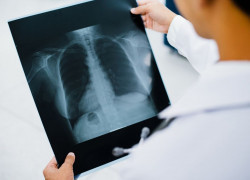Tuberculosis (TB) remains amongst the most significant causes of death and disability around the world.
The global burden
Nine million people globally developed TB in 2014, while it is estimated that two billion people have latent TB infection. However, thanks to persistent TB control efforts for many decades, the World Health Organization recognises Australia as one of the countries in a position to achieve the goal of eliminating TB as a public health issue by 2050.
The Doherty Institute's expertise
In order to do so, new approaches are needed, and teams across the Doherty Institute are working together towards developing innovative and influential strategies that draw on the wide range of expertise. The Doherty Institute provides a statewide service, the Victorian Tuberculosis Program, for public health management of TB including:
- Clinical care
- Epidemiology
- Contact tracing and rapid diagnosis of infection
- Drug resistance
There is also an active program of population health and mathematical modelling research, assisting with evaluation of effective and ethical TB strategies both in Australia and internationally. In addition, basic research on TB includes understanding the TB genome and the immune response to TB. The close collaboration amongst these groups with complementary expertise means that the Doherty Institute is an exciting environment for developing and implementing novel, high-impact strategies towards global TB elimination.
Victorian Mycobacterium Reference Laboratory
The Victorian Mycobacterium Reference Laboratory (MRL) provides specialised diagnostic testing for all mycobacterial diseases, most notably Tuberculosis and Buruli ulcer, for Victoria and the Northern Territory. In collaboration with the Victorian TB Program and the Microbiological Diagnostic Unit Public Health Laboratory, the MRL is an integral part of the Institute’s contribution to the areas of TB clinical care, epidemiology, contact tracing and rapid diagnosis of infection and drug resistance.





